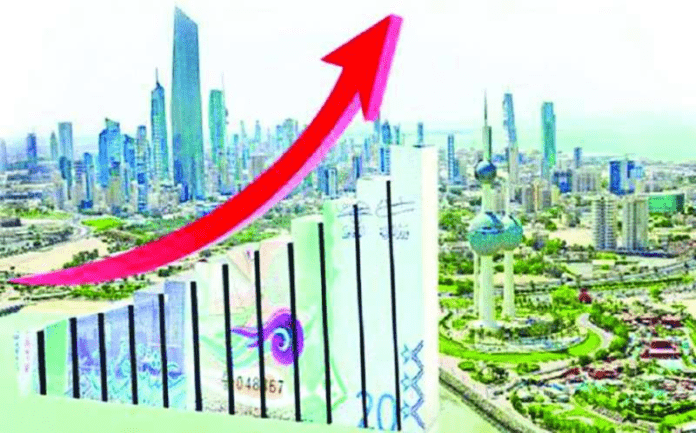The latest reports issued by the Institute of Chartered Accountants in England and Wales (ICAEW) states the rise in oil prices and production has brightened the economic outlook for Kuwait and is likely to grow by 7 percent in 2022 unlike 2.5 percent in 2021.
A local Arabic daily quoting sources from the institute indicated the abolition of Covid-19 restrictions which were imposed following the outbreak of the pandemic paved the way in Kuwait fir a strong recovery of economic activity after a modest decline in the first quarter of the year, expecting the non-oil sector to grow by 4.7% this year, on the back of high consumer spending and strong real estate sales after a 3.1 percent growth last year.
The report pointed out that the lending trends and the growth of corporate credit contribute to supporting the economic recovery despite the continuous delays in projects, adding that the Al-Zour refinery is on the verge of completion, which will increase the total refining capacity in the country by more than 0.6 million barrels per day, to 1.4 million barrels. Daily.
He noted that the oil sector, which accounts for more than half of the GDP, is a major driving force for the economy this year, with an expected growth of 11.8 percent on an annual basis, indicating that Kuwaiti oil production rose to more than 2.6 million barrels per day with the easing of production restrictions. OPEC Plus”, while the oil sector recorded a slight growth of 0.1 percent in 2021, after declining by about 10 percent in 2020.
The report stressed that the improvement in the future outlook for oil production and prices would enhance Kuwait’s financial situation, in light of expectations that the price of a barrel of oil would reach $112 in 2022, i.e. higher than the break-even price of Kuwait’s budget, estimated at about $65, suggesting that the government would record the first budget surplus. Since 2014 this year, at 6.2 percent of GDP.
He explained that the performance of the public finances improved thanks to the increase in oil revenues, as preliminary results indicate that the budget gap narrowed to 3.6 billion dinars in 2021, and the sharp rise in oil prices led to enhancing liquidity and reducing the urgent need to deal with fixed current expenditures on wages and subsidies (90 percent of total spending).
The report ruled out that the unexpected oil gains would lead to a significant increase in spending, but stated that the rise in government activity would support the non-oil sectors as well, pointing out that the state’s ability to implement important reforms had been hampered, including financial reform, due to repeated ministerial reshuffles and changes. administrative.
Although the report expects the reform process to remain slow, it assumes that a solution will be reached regarding the issuance of the Public Debt Law, which will allow the government to borrow internationally, and at the same time, future surpluses will be used to restore the General Reserve Fund, which had an effective role in Bridging the funding scarcity in recent years.
With the easing of financial pressures, the report believes that government spending will support domestic demand, mitigate the impact of higher financing costs, and reduce monetary stimulus will help in suppressing domestic price pressures.
The report stated that, as is the case regionally and globally, the inflation rate is rising in Kuwait, driven mainly by the rise in food and transportation prices, noting that core inflation is currently rising at a faster pace, which indicates that the price increases are widespread.
He expected inflation to remain high in the second half of this year, and to start declining as the supply chain turmoil subsides. In general, it is likely that the inflation rate will reach 3.9 percent this year, compared to 3.4 percent last year.
The report indicated that regardless of the risks posed by the decline in oil prices again, which would renew liquidity concerns and slow the progress of reform, the country is still vulnerable to the new “Corona” variables.
The report finds that vaccination campaigns in Kuwait were less successful than those in neighboring countries, as less than 10% of the population received the third dose.

















